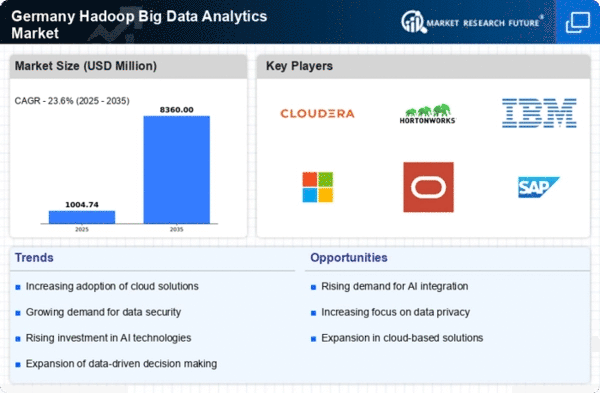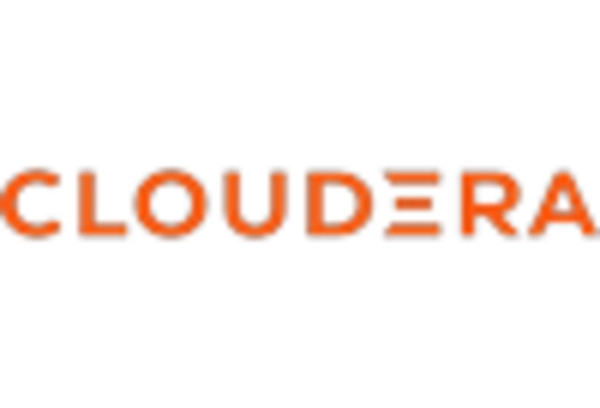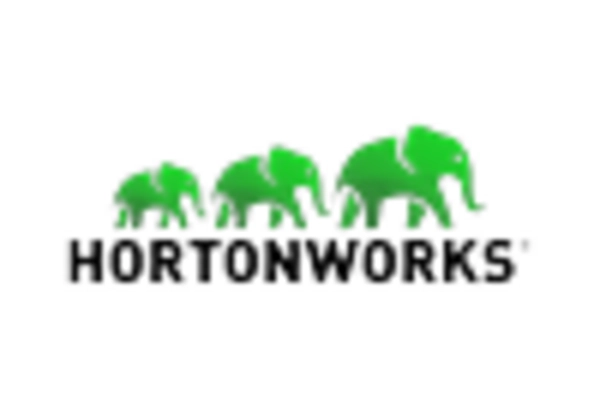Expansion of IoT Applications
The proliferation of Internet of Things (IoT) devices in Germany is significantly impacting the hadoop big-data-analytics market. As more devices generate vast amounts of data, the need for robust analytics solutions becomes paramount. The integration of hadoop technologies allows organizations to manage and analyze this influx of data effectively. It is estimated that the number of connected IoT devices in Germany will reach over 50 million by 2026, creating a substantial demand for analytics tools that can handle large-scale data processing. This expansion of IoT applications is likely to drive growth in the hadoop big-data-analytics market, as businesses seek to harness the insights generated from their IoT ecosystems.
Rising Demand for Real-Time Analytics
The hadoop big-data-analytics market in Germany is experiencing a notable surge in demand for real-time analytics. Organizations are increasingly recognizing the value of immediate insights derived from vast data sets. This trend is driven by the need for timely decision-making in competitive environments. According to recent data, the market for real-time analytics is projected to grow at a CAGR of approximately 25% over the next five years. Companies are leveraging hadoop frameworks to process and analyze data streams in real-time, enabling them to respond swiftly to market changes and customer needs. This shift towards real-time capabilities is likely to enhance operational efficiency and drive innovation within the hadoop big-data-analytics market.
Government Initiatives Supporting Big Data
The German government is actively promoting initiatives that support the development and adoption of big data technologies, including hadoop. Various programs aim to enhance digital infrastructure and foster innovation in data analytics. For instance, funding opportunities for research and development in big data applications are becoming more prevalent. This governmental support is likely to create a conducive environment for the hadoop big-data-analytics market, encouraging businesses to invest in advanced analytics solutions. As a result, the market may experience accelerated growth, driven by both public and private sector collaboration in harnessing big data capabilities.
Increased Focus on Data-Driven Decision Making
In Germany, there is a growing emphasis on data-driven decision making across various sectors, which is propelling the hadoop big-data-analytics market. Organizations are increasingly relying on data insights to guide their strategies and operations. This trend is reflected in a survey indicating that over 70% of German companies prioritize data analytics in their business processes. The ability to analyze large datasets using hadoop technologies enables firms to uncover trends, optimize performance, and enhance customer experiences. As businesses continue to recognize the importance of data in driving success, the hadoop big-data-analytics market is expected to witness sustained growth.
Growing Need for Enhanced Data Storage Solutions
As data volumes continue to escalate, the demand for enhanced data storage solutions is becoming increasingly critical in Germany. The hadoop big-data-analytics market is responding to this need by providing scalable storage options that can accommodate large datasets. Organizations are seeking efficient ways to store, manage, and analyze their data, leading to a rise in the adoption of hadoop-based storage solutions. It is projected that the data storage market in Germany will grow by approximately 20% over the next few years, further fueling the growth of the hadoop big-data-analytics market. This trend indicates a shift towards more sophisticated data management strategies that leverage hadoop's capabilities.
















